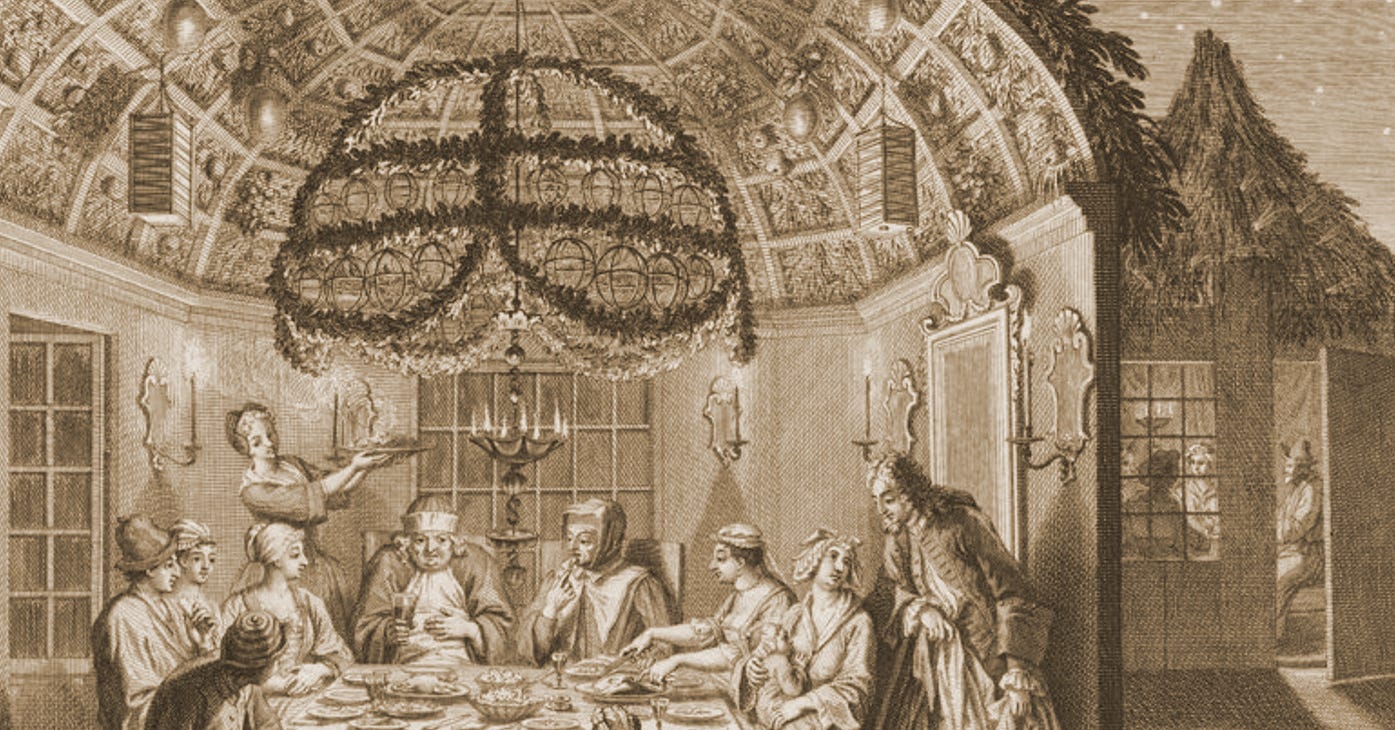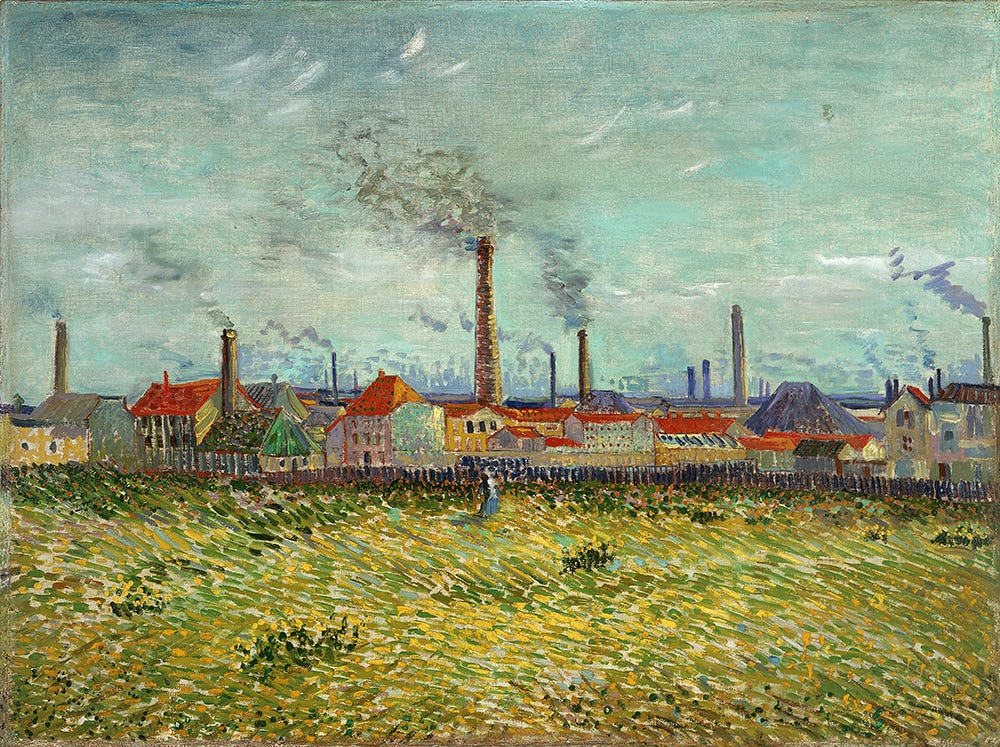Why does Sukkot always feel fake?
"Back to nature" movements, like camping, remind us that "nature" is full of contradictions.
Why does Sukkot, supposedly a holiday about returning to nature, feel so artificial?
I don’t know about you, but this bothers me every year. The four species of vegetation that I buy to fulfill an agricultural ritual mostly aren’t local to my area. Like basically all the food that I eat, they’re shipped from far away and they’re often shrouded in single-use plastic and styrofoam. The sukkah—which I build each year in memory of the temporary agricultural dwellings of my ancestors—is made of materials like electrical conduit, bungee balls, and plastic tarp that the rabbis of antiquity wouldn’t have recognized at all.
As I hoist monofilament-bound bamboo mats over wooden beams to fulfill this holiday’s technical religious definition of a “kosher” roof, I ask myself: am I doing something wrong? Is the way I connect to nature tainted by being…unnatural?
I think the answer is “no,” but the fact that this isn’t obvious gets to something we misunderstand about the word “nature” itself.
Camping is America’s Sukkot, and vice versa
This is not a uniquely Jewish problem. Consider a stereotypical American pastime: camping.
As a kid, I went on a lot of camping trips with my dad. Now that I’m a dad, I go on a lot of camping trips with my family. I love camping for the same reasons everyone loves it: there’s something invigorating about stepping into the woods, hiking a forested trail, cooking s’mores and hot dogs over a wood fire, spending the evening around its flames underneath a sky full of stars.
Still, as any camper knows, experiencing this stuff requires a lot of advanced tech! Like, what am I doing here, in this little patch of landscaped forest, surrounded by high-tech tents and RVs and a parking lot's worth of cars? Did I “do a nature?” How natural can any of this be when flush toilets and a place to charge my phone are no more than a hundred feet away?
Ironically, the deeper you go into nature the more tech you’ll need. Overnight backpackers, who ditch their cars to spend days away from civilization, require all sorts of specialized (and expensive) tools: ultralight tents, hiking poles, multitools, water filtration systems, fuel, dehydrated food, first aid, sometimes even bear spray. Even these hardy folks often follow recommendations from rangers for “backcountry camping.”
Could you ditch all this stuff? Maybe, but you’ll be miserable. Americans love nature—as long as they can love it on their own terms.
“Roughing it smoothly”
Because camping doesn’t seem like the sort of activity that has a history, these contradictions might look like a begrudging acceptance that even outdoorsy types like their creature comforts.
But this is incorrect. Terence Young has documented that camping as a pastime only came into existence after the Civil War. Alienated from their work by industrialization and physically removed from nature by urbanization, Americans (initially mostly white and wealthy) decided to find times to visit the outdoors. Young calls camping a form of pilgrimage. The term feels appropriate.
Unsurprisingly, the urbanites who trekked off to the woods cut a lot of corners. One of the earliest guides to camping is literally called Roughing it Smoothly (today there’s an RV company with the same name!). Specialized equipment soon followed. Drop a camper from the 1920s into REI and they’d immediately understand what the store was about.
This desire to cosplay as a pre-modern has literally shaped the American landscape. Yellowstone, a place so beautiful that it inspired the concept of the natural park (it was the first and now there are 63), was originally visited only by the very wealthy. It was the arrival of the car—and hundreds of miles of paved roads, and rustic-looking walkways, and drive-up campsites—that brought the world to Yellowstone’s door. The bison that you see around the park are “natural,” sure—but they’re also part of an intensive population revival scheme motivated by park’s existence. From Yellowstone to the lowliest state campground, natural and artificial are permanently entangled.

In other words, the artifice of camping isn’t a concession over some “pure” form of the pastime where you can’t eat until you’ve smelted iron and forged from it a hunting knife. Instead, the artificiality of the modern world is the reason that camping—and the sukkah—exists. It’s not a return; it’s an homage. We do it because we’re hopelessly modern.
“Back to nature” is beautiful and impossible
In an essay about his fellow science-fiction writer Philip K. Dick, the equally renowned Stanisław Lem wrote something that I haven’t been able to get out of my head.
Lem writes:
The action of [Dick’s] novels takes place in a time when there can no longer be any talk of returning to nature or of turning away from the “artificial,” since the fusion of the natural with the artificial has long since become an accomplished fact.
None of the characters in Blade Runner, for example, is trying to get back to a world without humanoid robots. Because Dick’s work starts with this assumption, it doesn’t get stuck moralizing that we should go “back to nature.”
Now, a natureless world is terrifying because our sense of morality is tied to our sense of what’s “natural;” whether this is good is a problem for a different post. (It’s also scary because we’re at the exact moment with climate change where the idea of “returning to normal” seems to be slipping away.) But Dick’s way of saying the future is also true for the present: “pure” nature just doesn’t exist anymore. We can periodically peel back our technology to experience a different mode of being—we do it on Shabbat, when camping, when building a sukkah—but these things are not true escapes from the modern world. They’re just different facets of it.
The natural world is our world now, and it can still be beautiful
In a recent book, art historian Michael Lobel notes that Vincent van Gogh, one of the quintessential painters of the natural world, actually depicts a fair amount of industry and pollution in his work.
Again, this only looks off if you see factories as necessarily contrasting with field. But the fields themselves are also the products of human labor; they’re both bits of nature bent to our will. It’s probably too much to call Van Gogh “cyberpunk,” but the juxtaposition of farms and factories as a beautiful mixture shares some similarities with the genre.
Sukkot gets it right
As I often say, technology erases its own history. It frequently replaces its predecessors, and it is frequently marketed as being new and unprecedented. It isn’t taught regularly in school. Most people really just remember the tech from their own lives, and maybe the lives of their parents.
Ironically, this lack of history means that we sometimes feel like we’re at the beginning of a new technological era when in fact we’re decades, or even centuries, into it. Nobody alive remembers a time when technology was static; rabbis in the 19th century already felt weighed down by the responsibility to address it in a timely fashion.
The entanglement of nature with artifice isn’t new; it’s the story of human civilization. Humans will never stop seeking nature untarnished, but they’ll always do it with the tools at hand. Sukkot, a nature holiday that relies on globe trade and modern materials, is part of that story. Don’t worry about using too many zip ties. It’s natural.
Anyway, that’s all for today. Enjoy the rest of the holiday.
P.S. If you haven’t listened to the most recent episode of Belief in the Future, you should. It’s one of our best—and the sequel is coming next week.




Thank you for this reflection - maybe this is another good reason to have read Kohelet a few days ago. Nothing really changes.
I also was struck by how you noted we're "at the exact moment" to appreciate the sense of something slipping away forever vis-a-vis climate change. It reminded me of a talk by Lawrence Krauss I once watched on YouTube in which he remarked about how we live at the exact moment to be able to understand the universe - too early and we could not exist, too late and we would be so distant from the energy and light of other galaxies and stars that we would never be able to figure it out.
Maybe lots of moments are really "exact moment"s.
Are you based in the US? Sukkot is one of the best examples of Hebrew indigeniety to the Land of Israel, where all of the fakeness you mentioned is stripped away: the season is the right season, the fruits the right and local fruits, the celebration attuned to the land. If anything, Sukkot reveals the artificial nature of Diaspora (where artificial is not necessarily a bad thing, it is just not a natural thing).